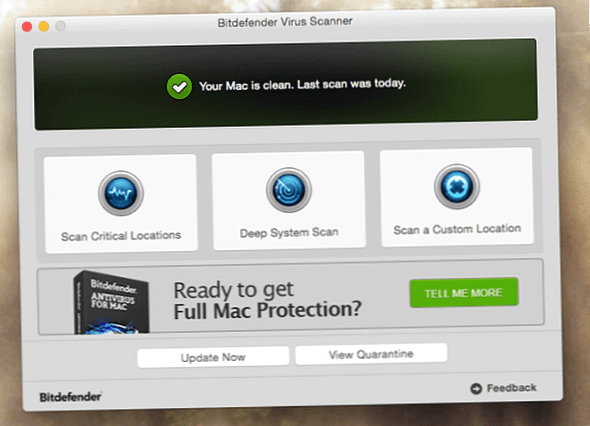
Is your Mac kind of… weird? Regardless of whether you see ads you can't explain or your system is unreasonably slow, the problem could be malware. And you might be right (but probably not).
In 2009, my coworker Jackson asked if Macs need virus scanners. Are antivirus programs for Mac necessary? Are antivirus programs for Mac necessary? Read more . The general consensus at the time was "no," but Macs have been growing in popularity ever since – and not surprisingly, so has Mac malware.
This doesn't mean you should panic: widespread infections are still rare. Your Mac is probably clean, even if it seems otherwise.
What is Mac malware??
Still, infections happen; Here are some examples from recent months:
- Wirelurker was spread via pirated Mac software. An attempt was made to infect an iPhone or iPad connected to infected Macs. In the process, one platform was transferred to the other, and in the process, the unique IDs of your devices were captured. No one is sure what the target of this malware is, but one researcher believes he can identify Chinese software pirates.
- iWorm infected users who downloaded pirated software from The Pirate Bay. Infected Macs become part of a global botnet.

- CoinThief infected users by pretending to be legitimate software and stole all the BitCoins stored on the infected Mac. Ouch.
Learn from these examples
All of these infections have one thing in common: they infect Macs through installed software outside of the Mac App Store. In some cases, pirated software is to blame; in others, it's software from sources that shouldn't be trusted.
Simply put, if you never install software outside of the Mac App Store, you have nothing to worry about. Sure, there are some browser-related exploits from time to time, and Java is a persistent problem. However, if your OS X and browsers are up to date, such infections are unlikely to happen.
If you install software from outside the Mac App Store, but search carefully for software before installing (google for a review and find an official download), you have nothing to worry about.
On the other hand: if you have installed a pirated copy of Mac software or installed plug-ins on request of a website with fake movies, you may have problems. If you used a tainted USB drive or downloaded a sketchy email attachment? Viruses can spread in unexpected ways The 7 types of computer viruses to watch out for – and, what they do Computer viruses can steal or destroy your data in many ways. Here are some of the most common types of viruses and how they work. Read more . Let's go through some signs that your Mac might be infected, just to be sure.
Sign 1: Unexpected displays and pop-ups
Adware is becoming a bigger problem on the Mac platform. If you're seeing ads in places they weren't before, there's a good chance you've installed something you shouldn't. This is especially true if you receive pop-up ads even when you are not browsing the Internet.
Sign 2: Your Mac is slow for no reason

As mentioned, some Mac malware components turn your Mac into a botnet, a global network of computers used for all sorts of purposes. If your Mac is infected, this may help DDoS use a website. What is a DDoS attack? [MakeUseOf explains] What is a DDoS attack? [MakeUseOf Explains] The term DDoS whistles by whenever cyber activism rears its head in a massive way. These types of attacks make international headlines for a variety of reasons. The problems that drive these DDoS attacks by leaps and bounds are often controversial or very high.
If your Mac is constantly slow, even when you don't have any programs open, this is possible.
Probabilities that malware is not your problem. You should probably know better how to speed up your Mac with these tricks [Mac OS X] Speed up an old Mac with these tricks [Mac OS X] Over time, a computer's performance will degrade – even Macs (gasp!). After years of not properly uninstalling applications, your hard drive may no longer be populated with preferences files and resources you no longer need. Read more, but it's worth checking malware if none of these tips work.
3. A malware scanner confirms the infection
Think your Mac might be infected? Make sure. Here are a few free programs you can use to scan your Mac and learn about infections:

- BitDefender Virus Scanner for Mac is a free tool. It won't delete infections for you, but it will point out where to delete them with the Finder. Note that the latest version has some issues according to user reviews.
- AdwareMedic searches for and deletes a number of common adware infections on your Mac. This is a quick scan. Therefore, try it if you see too many ads. Donations are requested, please help if the program helps you out.
- ClamXAV is the Mac version of ClamAV, a popular open source malware detection tool. It is worth a look.
If none of these tools do anything, it is highly unlikely that your Mac is infected. There are other apps like this – if you know something better, please let us know in the comments.
What security does my Mac come with??
Your Mac has defenses that should protect you from malware. Although all these measures are not absolutely foolproof. Here are some reasons why you don't have to worry (much):

- Gatekeeper, This protects your Mac and prevents uninformed users from potentially installing unsafe software. By default, this means that nothing came from the Mac App Store. However, you can also configure it to block apps from unknown developers. Of course, many Mac users disable Gatekeeper completely, allowing them to run whatever software they want, including components they put together themselves. The hope is that well-informed users will research the apps they run before installing them.
- Sandboxes. Apps installed through the Mac App Store have very limited access to the broader system. This restriction is to prevent one app from messing up your entire system.
- XProtect, officially called File Quarentine, is the anti-malware program you didn't know you had. This program has been part of OS X since 2009 and is not comparable to Windows antivirus programs. It's completely invisible to most users. You can't open the program and run a scan yourself, and you can't install updates manually. However, if you are infected with a known virus, you will probably be notified by this program. It also prevents you from opening infected files.
- Darkness is another frequently argued advantage of the Mac. Macs now have a growing market share, but for a long time there were so few active computers running OS X that malware creators didn't bother with them. It's called "security by obscurity" – and more than a few security experts will tell you it's a load of crap – but it has long comforted Mac users. Of course, with a growing number of Mac users, this is less true today than it was before – but Windows remains the main target for malware makers.
- We also explained system integrity protection (SIP) in newer macOS versions. 3 signs your Mac has a virus, and how to scan for them 3 signs your Mac has a virus, and How to scan for them weird? Whether you see ads you can't explain or your system is unreasonably slow, the problem could be malware. But you're probably wrong. Read more .